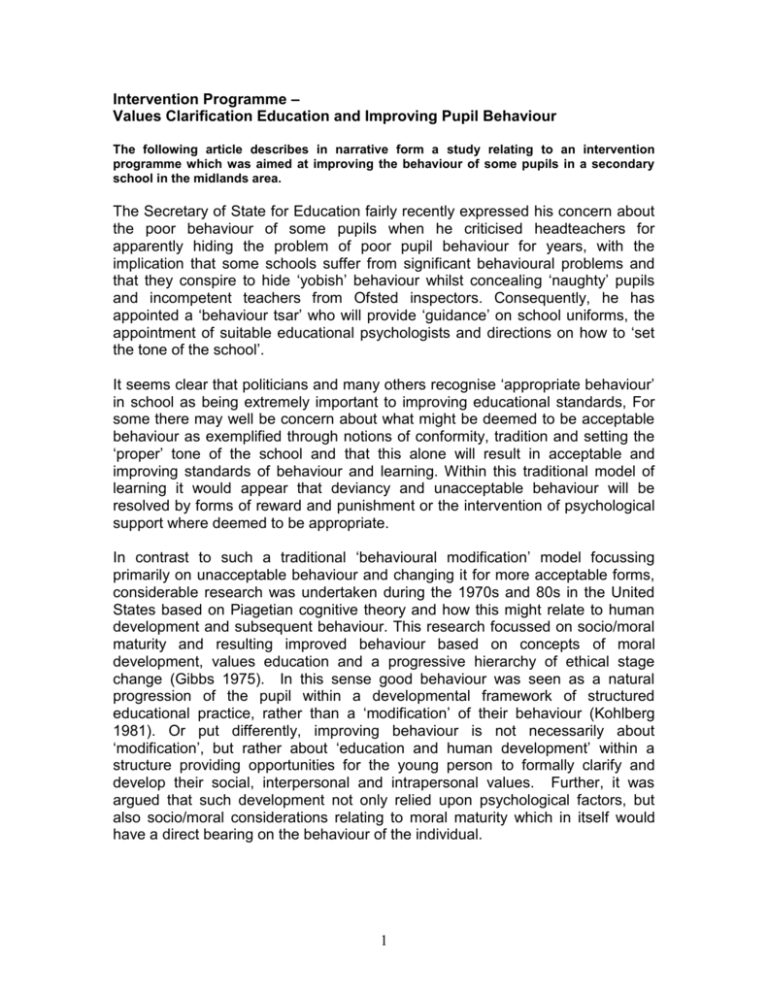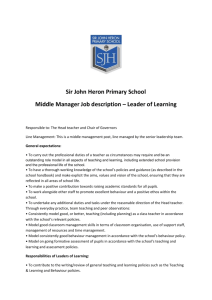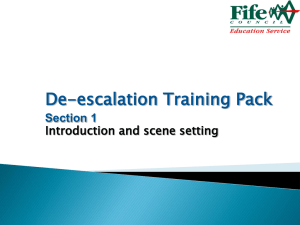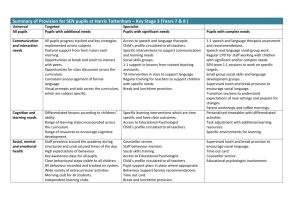
Intervention Programme –
Values Clarification Education and Improving Pupil Behaviour
The following article describes in narrative form a study relating to an intervention
programme which was aimed at improving the behaviour of some pupils in a secondary
school in the midlands area.
The Secretary of State for Education fairly recently expressed his concern about
the poor behaviour of some pupils when he criticised headteachers for
apparently hiding the problem of poor pupil behaviour for years, with the
implication that some schools suffer from significant behavioural problems and
that they conspire to hide ‘yobish’ behaviour whilst concealing ‘naughty’ pupils
and incompetent teachers from Ofsted inspectors. Consequently, he has
appointed a ‘behaviour tsar’ who will provide ‘guidance’ on school uniforms, the
appointment of suitable educational psychologists and directions on how to ‘set
the tone of the school’.
It seems clear that politicians and many others recognise ‘appropriate behaviour’
in school as being extremely important to improving educational standards, For
some there may well be concern about what might be deemed to be acceptable
behaviour as exemplified through notions of conformity, tradition and setting the
‘proper’ tone of the school and that this alone will result in acceptable and
improving standards of behaviour and learning. Within this traditional model of
learning it would appear that deviancy and unacceptable behaviour will be
resolved by forms of reward and punishment or the intervention of psychological
support where deemed to be appropriate.
In contrast to such a traditional ‘behavioural modification’ model focussing
primarily on unacceptable behaviour and changing it for more acceptable forms,
considerable research was undertaken during the 1970s and 80s in the United
States based on Piagetian cognitive theory and how this might relate to human
development and subsequent behaviour. This research focussed on socio/moral
maturity and resulting improved behaviour based on concepts of moral
development, values education and a progressive hierarchy of ethical stage
change (Gibbs 1975). In this sense good behaviour was seen as a natural
progression of the pupil within a developmental framework of structured
educational practice, rather than a ‘modification’ of their behaviour (Kohlberg
1981). Or put differently, improving behaviour is not necessarily about
‘modification’, but rather about ‘education and human development’ within a
structure providing opportunities for the young person to formally clarify and
develop their social, interpersonal and intrapersonal values. Further, it was
argued that such development not only relied upon psychological factors, but
also socio/moral considerations relating to moral maturity which in itself would
have a direct bearing on the behaviour of the individual.
1
Such theory and resulting practice fitted well with more recent ideas about school
homogony and the development of common values which would support the
concept of an ideal learning community.
Within such a context an intervention programme was introduced in one
secondary school situated in North Warwickshire and aimed at improving the
behaviour of a minority of pupils who exhibited unacceptable behaviour.
The staff were aware of the extremely poor behaviour of a small, but significant
number of pupils found throughout the school. It was felt that these pupils had a
disproportionally negative impact on the effectiveness of the school as a learning
organisation.
Many students entered the school with well below average attainment levels and
the number of students gaining five or more GCSE passes at grade C or above,
including English and mathematics, had remained significantly below the national
average…..continued efforts to address this, including reducing the numbers of
persistent absentees and improving students’ behaviour, had resulted in
students’ progress becoming satisfactory as the challenging targets set for the
current cohort were likely to be met. (Ofsted inspection report 2009).
It is within this contextual setting that this study of the integration programme
took place.
At this stage it was made clear to the school that the intervention programme
would be grounded on theory and practice relating directly to human
development and values clarification/education, rather than any form of
behaviour modification programme.
The intervention programme focussed on providing the selected pupils with the
opportunity to reconceptualise their values through a series of structured and
interactive activities. The programme lasted for 12 weeks and each pupil had
access to the programme for one hour a day each week during that period.
Approximately twelve pupils attended each session and worked with the team
leader and a number of trained social mentors.
The broad aim of the study was to evaluate the effectiveness and impact of the
intervention programme in bringing about positive changes in behaviour shown
by the participant pupils within the classroom and the school.
It was therefore decided to utilise a ‘case study’ approach which would allow a
focus on both relationships and outcomes.
The response from the resulting focus group indicated recognition of a significant
improvement in behaviour shown by the majority of the participating pupils, but
2
also possible causes of misunderstanding which might result in perceived
unacceptable behaviour by the pupil.
For example, the deputy head teacher involved in the project stated that:
“We’ve seen a really big improvement in her in school in terms of her ability to actually
stop and think in a conversation not to immediately say something and for it to be more
positive than it used to be because it always used to be a negative comment about
something.”
In particular there was a recognition that difficulties might easily be created by a
lack of shared values, leading to ‘misunderstands’ which resulted in ‘conflict’.
“That’s a really interesting point you’ve made and I think it reflects the title values for life
because a lot of the children you work with often fall out with staff because their values
are very different, they don’t understand that they have done something that you’re not
happy with because to them its ok, at home its ok.”
Further observations related to improved self discipline and the ability to take
more responsibility for the learning process:
“Now we’re onto another student now, a student I teach and therefore I can tell you that
there has been an amazing transformation in the classroom. At the beginning of the
project she was, she took almost appeared to take delight in being awkward in throwing
tantrums in my classroom.”
Nevertheless, further anxiety was expressed about the gulf that might exist
between values expressed at home and those held by teachers and the school,
thus leading to confusion and possible conflict:
“How do we give them the confidence to manage themselves when they’re at home?
Because some of the children that come obviously have conflicting values at home, now
if we’re trying to teach them something and they actually sort of come round to thinking,
well actually you know the more people I meet yes, I’m sort of thinking this but you’re
getting something that’s far stronger at home, or where you spend most of your time at
home it can cause conflict for the child because they’re trying their best to do what they
think is right, but then the people that should be showing them aren’t necessarily showing
them the same values.”
That values education can provide time to explain, discuss and examine other
people’s points of view and underpinning values, together with why they might
hold such views.
“…….we’ve had some interesting chats with Sarah and again, because we have got a
different role to you we can handle it very sensitively but differently. So she can talk
with us and it can give her the confidence to listen to what you’ve got to say and talk
through what you’re intending it to mean rather than what they’re perceiving it to be.”
That it is important to keep an open mind about what values might be and to
appreciate that working with young people, like the experience of life, is in itself a
continuous learning experience:
3
“I think its like a constant, like you say we’re always learning everyday, we’re all on a
journey but each child is different, I’m sure I could be doing this job for ten or fifteen
years and it would still come up with something that perhaps I’ve never dealt with
before.”
A self selected group of participating pupils also made their views known
regarding the value of the intervention programme and the following statements
express some of the sentiments stated in the semi structured interviews:
Generally all of their comments were positive and they appreciated the progress
they had been able to make about better understanding themselves and their
personal situations. The following examples reflect the majority view:
“I enjoyed learning more about myself. And from my past and it helped me to change It
showed me what I’ve got in myself and showed me what positive things other people
think about me that I didn’t know before. I’ve learned that I’ve got more on my good side
and that I’m caring, more warm hearted and kind. Now I’ve got a less bad attitude and I’m
less bad tempered; this has helped me quite a lot.”
What was really appreciated was the opportunity to talk with adults about matters
that were important to them and to learn what other people thought about them.
This intrapersonal development was seen as valuable and important to all those
pupils who were interviewed.
“I enjoyed it (the programme) and found out about my personality; I have 'Asperger's' and
this means that I find it difficult to make friends. Since being involved I have made more
friends and I have grown as a person massively.”
Overall the intervention programme was identified as being successful by the
senior and other staff of the school and considered to be extremely helpful by
participating pupils by enabling them to become more aware of themselves and
others. In the case of the senior staff there was a realisation that many of the
problems may well have been caused by a lack of consensus over the
interpretation of values between pupils and staff and that there was considerable
divergence between such interpretation at home and at school. Central to this
theme is the notion of seeing the school as a community in a wider context.
including all parents, in order to encourage a homogenous community.
Perhaps equally important in this context is the need to understand differences in
ways of expressing such values and the need to respect, but not necessarily
agree with variations: that without access to structured dialogue, debate and
reflection together with a positive and powerful school climate, or ethos, some
pupils will find it difficult to understand why different adults react in different ways
in the same or similar situations, leading to confusion, argument and division.
Perhaps most importantly the intervention programme has provided evidence to
show that for some pupils values education may be a necessity if they are to
succeed at school.
David Rowse
© David Rowse 2013 All rights reserved
4
5









